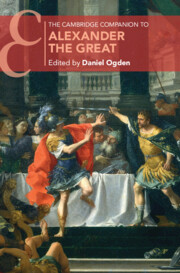Refine search
Actions for selected content:
9 results
Chapter 15 - Hannibal and Scipio as Military Advisers in the Late 190s: The Road to Magnesia, 190
-
- Book:
- Hannibal and Scipio
- Published online:
- 05 September 2024
- Print publication:
- 26 September 2024, pp 303-336
-
- Chapter
- Export citation
Chapter 5 - Hannibal Frustrated in Italy, 216–208
-
- Book:
- Hannibal and Scipio
- Published online:
- 05 September 2024
- Print publication:
- 26 September 2024, pp 137-154
-
- Chapter
- Export citation

The Cambridge Companion to Alexander the Great
-
- Published online:
- 04 January 2024
- Print publication:
- 18 January 2024
Chapter 5 - Macedon
-
- Book:
- Greek Declamation and the Roman Empire
- Published online:
- 22 June 2023
- Print publication:
- 06 July 2023, pp 119-150
-
- Chapter
- Export citation
9 - The Use of Divination by Macedonian Kings
-
-
- Book:
- Divination and Prophecy in the Ancient Greek World
- Published online:
- 22 December 2022
- Print publication:
- 05 January 2023, pp 219-239
-
- Chapter
- Export citation
6 - Architectural Rhetoric and the Rhetoric of Architecture
-
-
- Book:
- Housing in the Ancient Mediterranean World
- Published online:
- 08 July 2022
- Print publication:
- 21 July 2022, pp 212-228
-
- Chapter
- Export citation
Six - Ancient Methone (354 B.C.)
-
-
- Book:
- The Destruction of Cities in the Ancient Greek World
- Published online:
- 09 September 2021
- Print publication:
- 30 September 2021, pp 108-128
-
- Chapter
- Export citation
Seven - The Destruction of Cities in Northern Greece during the Classical and Hellenistic Periods
-
-
- Book:
- The Destruction of Cities in the Ancient Greek World
- Published online:
- 09 September 2021
- Print publication:
- 30 September 2021, pp 129-162
-
- Chapter
- Export citation
9 - Rome, the fall of Macedon and the sack of Corinth
-
-
- Book:
- The Cambridge Ancient History
- Published online:
- 28 March 2008
- Print publication:
- 07 December 1989, pp 290-323
-
- Chapter
- Export citation
